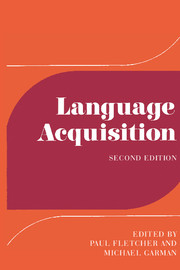Book contents
- Frontmatter
- Contents
- Contributors
- Preface
- Part I Contexts and determinants
- Part II The development of linguistic systems: phonology
- Part III The development of linguistic systems: grammar
- Introduction
- 13 Early vocabulary
- 14 Early syntax
- 15 Assessing morphological development
- 16 Personal pronouns
- 17 Tense and aspect
- 18 Modality
- 19 Deixis
- 20 A crosslinguistic perspective: morphology and syntax
- Part IV Later language development
- Notes to chapters
- Bibliography and citation index
- General index
- Titles in the series
14 - Early syntax
Published online by Cambridge University Press: 05 June 2012
- Frontmatter
- Contents
- Contributors
- Preface
- Part I Contexts and determinants
- Part II The development of linguistic systems: phonology
- Part III The development of linguistic systems: grammar
- Introduction
- 13 Early vocabulary
- 14 Early syntax
- 15 Assessing morphological development
- 16 Personal pronouns
- 17 Tense and aspect
- 18 Modality
- 19 Deixis
- 20 A crosslinguistic perspective: morphology and syntax
- Part IV Later language development
- Notes to chapters
- Bibliography and citation index
- General index
- Titles in the series
Summary
Introduction
In the previous edition of this volume, Garman (1979) assembled an impressive array of results from work that had so far been published on early grammatical development, starting just prior to the first word combinations and including developments reported for children as old as 4;6. His account provides a useful integration of information from four, somewhat parallel, strands of development: growth in vocabulary size, the progressive differentiation of word classes (with respect to grammatical function), mean length of utterance (MLU), and emerging types of grammatical constructions. Rather than repeat Garman's synthesis, or merely extend it with such new results as have appeared in the past five years, I will refer the interested reader to Garman's chapter and take a complementary approach in this one.
I will begin, as did Garman, with the period just prior to the first word, but I will only attempt to cover early syntax, specifically productions up to several words in length. Moreover, my focus will be on how the learner approaches the problem of the acquisition of syntax, rather than on comparison of children's stages with adult norms. To this end, we will be looking at learners' strategies as well as at identifiable processes and transitions in syntactic development. Before proceeding, I must first introduce some basic themes that will underlie this approach to early syntax.
Processes and transitions
The first theme is the focus on the dynamic process of language development as opposed to static stages.
- Type
- Chapter
- Information
- Language AcquisitionStudies in First Language Development, pp. 307 - 325Publisher: Cambridge University PressPrint publication year: 1986
- 10
- Cited by

